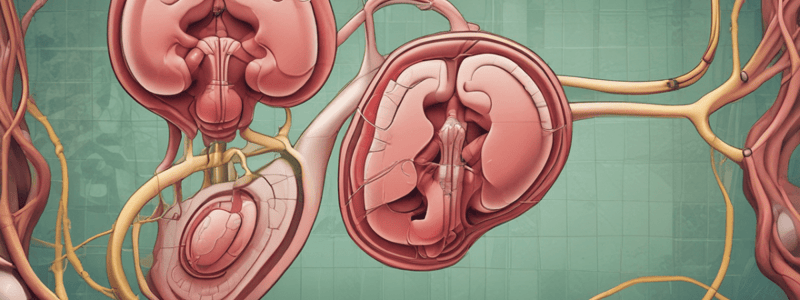Podcast
Questions and Answers
Wegener's granulomatosis cannot be a cause of rapidly progressive glomerulonephritis.
Wegener's granulomatosis cannot be a cause of rapidly progressive glomerulonephritis.
False (B)
Hyperparathyroidism, sarcoidosis, and bone diseases can lead to the formation of magnesium ammonium phosphate kidney stones.
Hyperparathyroidism, sarcoidosis, and bone diseases can lead to the formation of magnesium ammonium phosphate kidney stones.
False (B)
Plasma exchanges are not part of the necessary therapy for idiopathic necrotizing glomerulonephritis.
Plasma exchanges are not part of the necessary therapy for idiopathic necrotizing glomerulonephritis.
False (B)
Secondary glomerulonephritis can be asymptomatic in some cases.
Secondary glomerulonephritis can be asymptomatic in some cases.
Kidney stones composed of calcium oxalate and/or phosphate account for 15% of all kidney stones.
Kidney stones composed of calcium oxalate and/or phosphate account for 15% of all kidney stones.
Cystoscopic basket extraction is a common method for removing kidney stones located in the bladder.
Cystoscopic basket extraction is a common method for removing kidney stones located in the bladder.
Chronic Kidney Disease Stage 1 is characterized by the inability to properly concentrate urine.
Chronic Kidney Disease Stage 1 is characterized by the inability to properly concentrate urine.
Survival rates for individuals undergoing hemodialysis and peritoneal dialysis are significantly different.
Survival rates for individuals undergoing hemodialysis and peritoneal dialysis are significantly different.
The procedure urostomy/ileal conduit involves the attachment of ureters to the abdominal wall.
The procedure urostomy/ileal conduit involves the attachment of ureters to the abdominal wall.
Acute tubular necrosis is caused by endogenous toxins only.
Acute tubular necrosis is caused by endogenous toxins only.
Permanent renal damage is not a common outcome of acute tubular necrosis.
Permanent renal damage is not a common outcome of acute tubular necrosis.
Volume depletion can be a cause of acute tubular necrosis.
Volume depletion can be a cause of acute tubular necrosis.
Invasive Bladder Cancer is usually low grade and does not tend to spread.
Invasive Bladder Cancer is usually low grade and does not tend to spread.
Carcinoma in Situ (CIS) of the Bladder involves cancer cells only in the cell membrane.
Carcinoma in Situ (CIS) of the Bladder involves cancer cells only in the cell membrane.
Chronic pyelonephritis can lead to scarring and exposure to lead or cadmium.
Chronic pyelonephritis can lead to scarring and exposure to lead or cadmium.
Acute Pyelonephritis is characterized by a decreased white blood cell count.
Acute Pyelonephritis is characterized by a decreased white blood cell count.
Membranous lesions indicate glomerular and basement membrane abnormalities.
Membranous lesions indicate glomerular and basement membrane abnormalities.
Medullary sponge kidney can cause symptoms such as hematuria or pyuria.
Medullary sponge kidney can cause symptoms such as hematuria or pyuria.
Nephrogenic diabetes insipidus is always an inherited disorder.
Nephrogenic diabetes insipidus is always an inherited disorder.
Horseshoe kidney is a condition where the kidneys are joined at their upper poles.
Horseshoe kidney is a condition where the kidneys are joined at their upper poles.
High potassium levels can lead to Nephrogenic diabetes insipidus.
High potassium levels can lead to Nephrogenic diabetes insipidus.
A urine culture will not reveal the causative bacterium in cases of urinary stones.
A urine culture will not reveal the causative bacterium in cases of urinary stones.
Crescents in Glomerulonephritis can compress and distort the glomerular capillary wall.
Crescents in Glomerulonephritis can compress and distort the glomerular capillary wall.
Acquired blockage in the urinary tract can cause Nephrogenic diabetes insipidus.
Acquired blockage in the urinary tract can cause Nephrogenic diabetes insipidus.
The cortex is the inner layer of the kidney.
The cortex is the inner layer of the kidney.
The basement membrane allows all protein molecules to pass through into the circulating blood.
The basement membrane allows all protein molecules to pass through into the circulating blood.
Bowman’s capsule surrounds the glomerulus.
Bowman’s capsule surrounds the glomerulus.
Aldosterone causes the kidneys to retain only potassium.
Aldosterone causes the kidneys to retain only potassium.
Proteinuria refers to the presence of protein in the urine.
Proteinuria refers to the presence of protein in the urine.
Renin is produced when blood pressure is high.
Renin is produced when blood pressure is high.
Flashcards are hidden until you start studying




